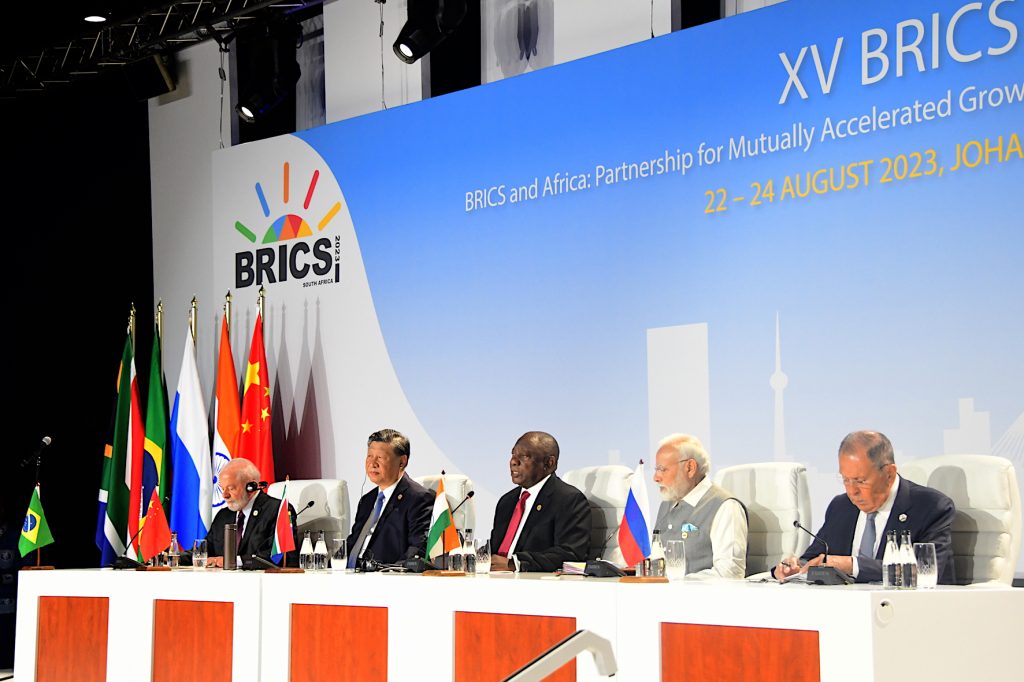On August 24th, the president of South Africa Cyril Ramaphosa announced the outcomes of the 15th BRICS summit. Six countries were invited to become full members of the group.
“We have decided to invite the Argentine Republic, the Arab Republic of Egypt, the Federal Democratic Republic of Ethiopia, the Islamic Republic of Iran, the Kingdom of Saudi Arabia and the United Arab Emirates to become full members of BRICS. The membership will take effect from 1 January, 2024”, the president declared during the media briefing.
The 15th BRICS summit took place in Johannesburg, South Africa, on August 22-24. The annual high-level international conference was attended by the leaders of five member states (Brasil, Russia, India, China, and South Africa), as well as by other heads of state and government from the Global South.

The president of the South African Republic Cyril Ramaphosa has extended invitations to 67 leaders of countries in Africa, Asia, and Latin America. South Africa’s BRICS Sherpa Anil Sooklal has announced that all African leaders were invited to attend the conference.
As for August 24th, the closing day of the summit, the arrival of 18 leaders of African states, including the prime minister of Ethiopia, was announced by the press service of the summit and by the national news agencies. The meeting was also attended by five prime ministers, five vice presidents, seven ministers of foreign affairs and three ministers of finance. The HSE Center for African Studies provides statistics on the level of participation in comparison with the Second Russia-Africa Summit held in Saint Petersburg on July 27-28.
The events aimed at fostering dialogue between the BRICS members and leaders of the countries interested in cooperation with the group were BRICS-Africa Outreach and BRICS Plus Dialogues. The China-Africa Leaders’ Dialogue also took place on the summit’s sidelines. According to the Chinese foreign ministry spokesperson Wang Wenbin, the African Co-Chair of the Forum on China-Africa Cooperation, the Chairperson of the African Union, and representatives of the regional economic communities have been invited to the dialogue. The events were scheduled for August 24th, the summit closing day.
BRICS expansion
Regarding the statement of the minister of international relations and cooperation of South Africa Naledi Pandor during the media briefing on August 7th, 23 countries have applied to join the BRICS. The list includes Algeria, Egypt, Ethiopia, Nigeria and Senegal. Despite South Africa’s announcement of Morocco’s application, the government of the kingdom has disproved this information. The government of South Africa has also declared that over 40 countries, including the Democratic Republic of the Congo, Comoros, and Gabon, have expressed interest in joining the group.
Algeria is notable for its absence on the list of new BRICS members. The president of the country Abdelmadjid Tebboune did not attend the summit as well. The delegation was led by the minister of finance Laaziz Faid. Algeria applied to join the group and later submitted a request to become a shareholding member of BRICS Bank with a contribution of USD 1.5 billion. In July, the president of the country undertook a state visit to China and discussed the prospects of cooperation with the president Xi Jinping.
On August 23rd, BRICS declared that a document that sets out the principles and guidelines for the group’s expansion was adopted. That was announced by Naledi Pandor on Ubuntu Radio, the South African foreign ministry radio station.
According to Andrey Maslov, the director of the HSE University Center for African Studies, Africa could become the first-choice destination for the BRICS sectoral initiatives. Andrey Maslov states that on August 24 a new stage of African politics began in Russia. “It will be a time of coordinated decision-making, multilateral actions and initiatives, when we are considering not only our own interests but also engaged in the long-term capacity building with our partners from the world majority”, he foresees. Nevertheless, Andrey Maslov argues that Algeria’s membership in BRICS could have strengthened the group, and the rejection of the country’s bid to join the alliance is a significant omission.
Kirill Babaev, the director of the Institute of China and Contemporary Asia of the Russian Academy of Sciences, and Sergey Lavrov, the expert of the Center for World Politics and Strategic Analysis, state that the legal structure of BRICS does not allow the group to be considered neither an international organisation nor a intergovernmental association, as BRICS lacks the regulation, rules of conduct for members, and administrative body to provide technical coordination. The experts highlight that one of the main reasons for the BRICS disunity is the lack of its own development strategy. They suggest that the adoption of the concept of the BRICS Common Economic Space (CES) and the development of a strategic manifesto could be the appropriate solutions for structuring the group.
Author:
Daria Sukhova
